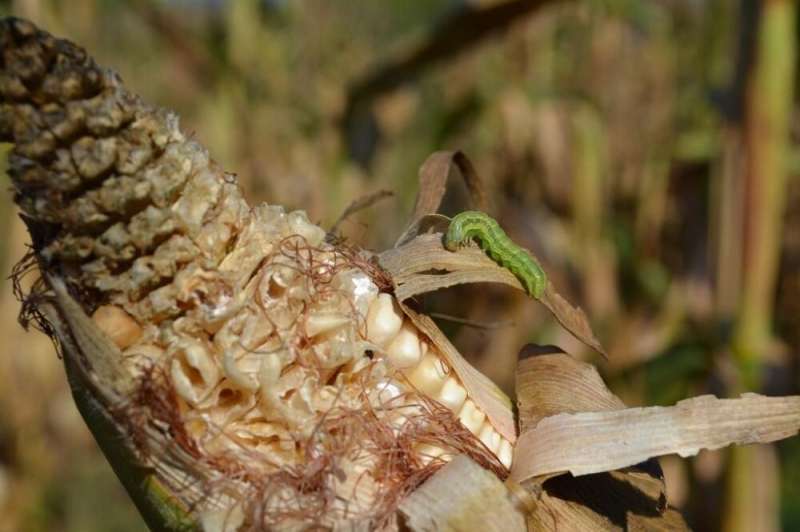New research proposes local Biological Control Agent hubs to fight fall armyworm in Bangladesh

New CABI-led research, working in conjunction with the Bangladesh Agricultural Research Institute (BARI), proposes the establishment of local Biological Control Agent (BCA) hubs to fight the devastating fall armyworm pest in Bangladesh.
The scientists, who published their findings in the CABI Agriculture and Bioscience journal, say a non-linear business model could reverse the current low uptake of safer-to-use and more environmentally friendly BCAs to fight fall armyworm (Spodoptera frugiperda) by maize farmers in the country.
Pest of great concern
Fall armyworm is of great concern, as globally evidence of yield loss and economic injury from the pest in various crops—including maize, cotton, sorghum and others, has been well documented. In Bangladesh, maize cultivation has grown in importance since the 1980s and is now amongst the country's top three important crops.
Dr. Mariam Kadzamira, lead author of the study, highlights how farmer uptake of BCAs is hindered by several factors. This includes the lack of BCA availability in local markets, negative farmer and agro-dealer perceptions, poor input industry linkages for the supply of BCAs products to agro-dealers and inadequate institutional finances for capacity building of and technical support by research scientists and extension agents.
Dr. Kadzamira says that "given these challenges to BCAs uptake, an innovation systems-based business model that links researchers, extensionists, agro-dealers and farmer producer organizations in a non-linear pathway is proposed for Bangladesh."
"This translates into the establishment of local BCA production hubs owner-managed by farm entrepreneurs, with scientists providing them with nucleus culture, while extension services provide technical support for quality assurance."
"The interaction between all stakeholders is non-linear with all actors intellectually consulted and engaged, with technical capacity on BCAs available for any actor requiring it."
Multi-disciplinary research
Co-author Dr. Malvika Chaudhary adds that multi-disciplinary research, that takes account feedback from stakeholders, complements the process—therefore, generating robust and relevant knowledge for feedbacking to improve the business model, capacity building initiatives and farmer engagement.
The scientists argue that biological control is seen as a potential management strategy for fall armyworm as it can provide long-term control without harming the environment and human health. With the appropriate resources and effort, BCAs can be effective for the management of fall armyworm in maize as well as other at-risk crops.
Dr. Chaudhary says that "cases of local BCAs production are few but emerging globally. In Bangladesh there is no clear guidelines on the profitability and costs of establishing local BCAs production hubs by farm entrepreneurs for FAW infested areas."
"This study contributes to this as it provides insights for practitioners, governments and funders on a type of business model that can be used for establishing local BCAs production hubs."
"To fully operationalize this business model, there is need for long term financial and technical support for the Bangladesh Agricultural Research Institute (BARI), extension services as well as farmer producer organizations."
Further research needed
The researchers conclude by suggesting that further research is needed to understand and quantify the timelines when the proposed business model would become self-sustaining and the type of support that would be needed for relevant stakeholders during this time.
Other research, they say, could also focus on Gender Equality and Social Inclusion analysis, to capture gendered differences in terms of farmer perceptions, usage and knowledge of BCAs as well as farmer-willingness-to-pay.
More information: Mariam A. T. J. Kadzamira et al, A non-linear approach to the establishment of local biological control agent production units: a case study of fall armyworm in Bangladesh, CABI Agriculture and Bioscience (2022). DOI: 10.1186/s43170-022-00115-5
Provided by CABI





















